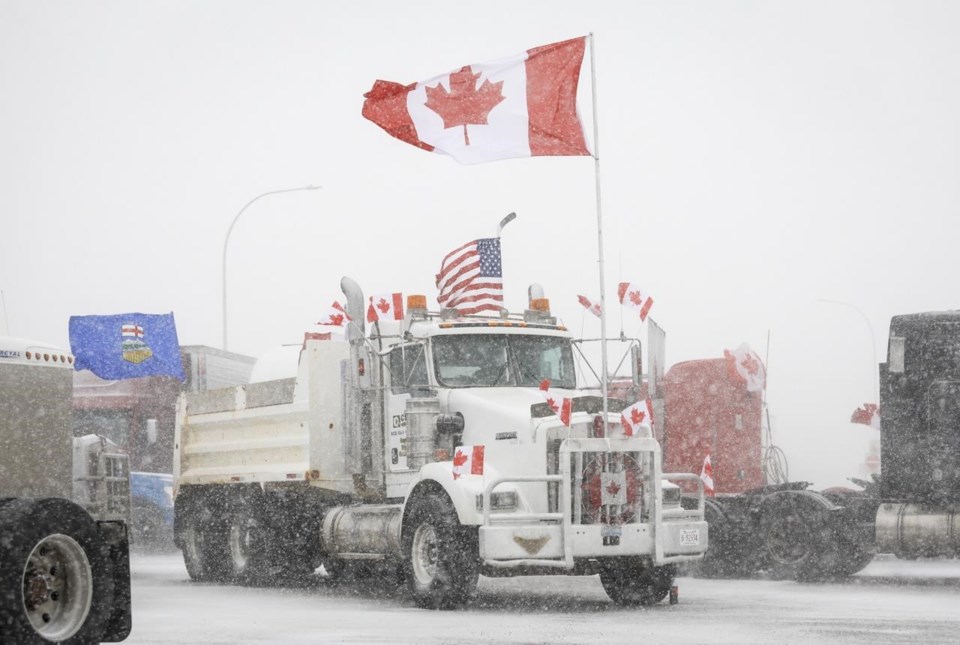COUTTS, Alta. — A trucker blockade in southern Alberta at the United States border turned violent Tuesday after some protesters breached police barriers to join the demonstration and Mounties backed off out of concern for safety.
Premier Jason Kenney called for demonstrators to voice their condemnation of COVID-19 safety measures peacefully and to stop blocking a crucial commerce route.
“This kind of conduct is totally unacceptable," Kenney said during a news conference in Edmonton. “Without hesitation, I condemn those actions and I call for calm.”
Kenney said he heard reports that RCMP officers had been assaulted during the day, but Mounties could not confirm them.
Events moved swiftly after RCMP announced in the afternoon that negotiations to have the convoy leave had failed and it was time to enforce the law at the Coutts, Alta., crossing.
As teams of officers approached truck cabs, a handful of drivers began slowly peeling off and heading away. At the same time north of Coutts, other protesters breached an RCMP roadblock on Highway 4 and joined the blockade.
"They did that by driving at quite high speeds through the ditches and fields," said Cpl. Curtis Peters in Coutts.
Some tractors crossed into the northbound lanes, going south, in a dangerous manner, he added. High-speed farm equipment also weaved by RCMP vehicles into ditches with Canadian flags ripping in the wind.
A head-on crash happened at that time, which resulted in an assault, said Peters. RCMP don't know if the people involved were part of the convoy and the altercation is under investigation.
He said there were no significant injuries.
"Our intention remains to restore movement of goods and vehicles on the road but not at the risk of public safety, which is why we had to reposition and reconsider for the time being today," said Peters.
"I'm calling for calm. I'm calling for a return to diplomacy."
No arrests were made, though RCMP said previously they were prepared to do so and tow away vehicles if necessary.
Peters added that protesters also visited the home of the Coutts Mayor Jim Willett and his wife to take photographs and wave through the windows. He said the couple should not be subjected to harassment and urged protesters to leave them alone.
The blockade has snarled and stalled traffic at the border crossing since Saturday, leaving travellers and truckers on both sides stranded and locals unable to access goods and services, including medical care.
The RCMP noted that while peaceful assembly is allowed, the demonstrators were contravening federal and provincial laws that forbid anyone from impeding access to critical infrastructure.
Kenney said the situation remained fluid and urged travellers to use border crossings at other points of entry in the province. He is working with the federal government to see if it can extend service and working hours at those locations.
“We can expect there will continue to be some interruption at the Coutts border crossing perhaps for some time to come as the RCMP deals with the road blockage there,” said Kenney.
The demonstration started in solidarity with demonstrations countrywide and in Ottawa against cross-border truckers having to be vaccinated against COVID-19 and other public health measures.
Early Tuesday, the line of trucks had thinned out but still stretched two abreast as far as the eye could see in chilling wind and -20 C temperatures.
Canadian flags flew from some trucks. Others sported upside-down Maple Leafs and homemade signs and placards: "True North Strong Proud and Free." "Mandate Freedom or Liberation is Coming."
The mayor said the protest is isolating the village’s 250 residents.
Mail delivery had been stopped and some children were forced to stay home from school Monday because their bus could not get into the community. There were reports of residents not receiving at-home medical care.
The blockade also left truckers stranded in the U.S.
Lovepreet Singh said he arrived in Edmonton on Tuesday after waiting in Montana with 150 other trucks and a full load of fruit and vegetables for more than two days.
Singh said it was a frustrating wait that put the health of some truckers at risk.
“That's not how Canadians behave,” said Singh in an interview.
“There are people (who) have medical issues like blood pressure issues, thyroid issues, asthma.”
He said many of those waiting ate pizza every day from a nearby store while listening to a constant refrain from police to sit tight and wait.
Singh said he eventually detoured through icy roads in British Columbia at a cost of seven extra hours and $400 in gas.
Some truck drivers who left earlier risked driving through snow squalls, he said. One rig hit the ditch.
“We don't make enough money to survive in these kinds of situations,” said Singh. “It's even hard for us to pay all the bills and (provide) for our family.”
— With files from Dean Bennett and Fakiha Baig in Edmonton
This report by The Canadian Press was first published Feb. 1, 2022.
Alanna Smith, The Canadian Press
Note to readers: This is a corrected story. A previous version misspelled Mayor Jim Willett's last name.



